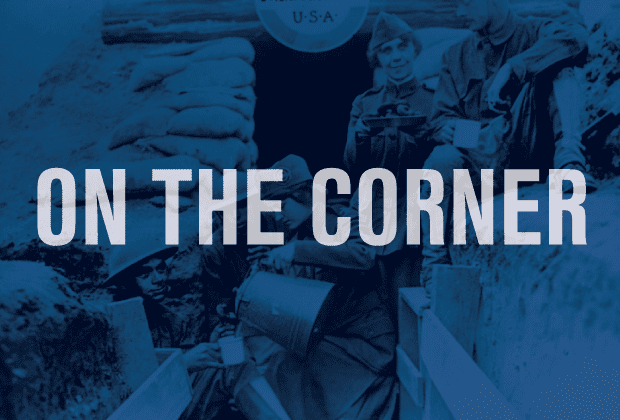By Bob Docter, Editor-in-Chief –
Father’s Day, often, arrives concurrently with the commissioning of cadets as it did last month, and thus does not take precedent in print.
For me, however, Father’s Day nudges distant memories and awakens strong feelings that bring with them tears and joy, pain and pleasure, marvel and wonder. My father, who never knew his own father, revealed qualities of commitment, creativity and always compassion. With generosity and joy, he gave them to his sons. He mixed them with humor, cautious freedom and an abiding love.
My twin brother Richard and I had wonderful modeling from both parents, and both made major contributions to each of our identities, our value structure, our personalities, and the nature of our relationship with God. We are forever grateful for these gifts.
Diane and I, along with our six children and their families, celebrated Father’s Day a week late. Besides the fun and festivities, it gave me an opportunity to read to them material my brother had written for the program of our father’s memorial service. He captured his essence with beauty, poignancy and love. I wanted our family to grasp a sense of their heritage.
My brother wrote:
Lloyd Wilfrid Docter was born in Helena, Mont., on March 3, 1899. His early years were very difficult for he was not planted by the rivers of water. Without a father in the home, this only son took responsibility while very young to assist his mother though difficult years. He was proud of his beginnings as a newsboy on the streets of Great Falls, and he cherished memories of finding scraps of coal along the railroad tracks in this city where winter could inflict pain.
He joined The Salvation Army following a street meeting conducted by Annie Hurst and Maud Williams, and his final resting place will be within an arm’s reach of these dear comrades. Entering The Salvation Army Training College in Chicago at the age of 16, the mainstream of his life was devoted entirely to this Army of God.
His officership spanned a period of 31 years and included almost every possible kind of appointment. He served as a corps officer in the small mining towns of Colorado and Montana, aide to Commissioner Adam Gifford and Commissioner George Davis, and served in many divisional and staff positions.
In 1922 he was married to Violet Muriel Hay, the daughter of Lt. Colonel and Mrs. John W. Hay, who pioneered The Salvation Army’s work in Canada and the Western United States. No wife ever showed greater loyalty and devotion to a husband. A son, Wilfrid Barnard Docter, was born in 1924, to be taken only 18 months later in a tragic accident. His twin sons, Robert and Richard, born in 1928, were a source of pride and satisfaction to him. While he shared his life with many, he held his family closest of all and took comfort in their presence during the closing days of his life.
Lloyd Docter will be remembered as a dedicated, hard-working man with a mission who never gave up until the job was finished. He dreamed bigger dreams and drew broader plans than most of us can, and when he took leadership, we always knew that everything was under control. He’s gone now, but he gave us a rich heritage to treasure and traditions that will endure, for this was the man with the biggest heart of all.
As the shadows lengthened into evening on the final day of
Nineteen hundred sixty-two, Lloyd Docter expressed these
words to his pastor, Captain Robert Tobin, who recorded
them faithfully. He never preached a more eloquent sermon,
and we treasure this final message from a man whose work
on earth was complete.
At a time like this I’ve come to realize that God is as big as our need, as great as our faith, as sure as our dependence on him. He is limited in this way not because of his inability to do more, but because of our inability to receive more.
I’ve come to wonder about the phrase, “should not perish.” It’s not part of God’s plan that any should perish in a physical sense. We can live our lives the way we want, and our bodies give out, not because it’s God’s plan that they should, but because of the decision Adam made for us in the beginning. God’s plan takes over after Adam’s plan has been fulfilled. He gives us eternal life because of our acceptance of his plan.
The beauty of a lifetime of closeness to God is to be found in the fact that there is no reason or need to act out your religion at a time like this. There is no need to fold napkins or light candles or fulfill any ritual. There is not even any reason to say any special prayers. My life has been in his control for a long time and I just say to him: ‘Well Lord, I’ve had a coronary, but I’m still yours.’
My final words to him on the evening of Jan. 4, 1963, were, “See you later, dad, I love you”—and I will.











